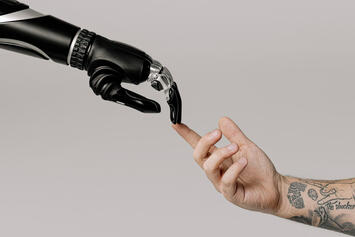
The future of humanity is becoming ever less human. The astounding capabilities of ChatGPT and other forms of artificial intelligence have triggered fears about the coming age of machines leaving little place for human creativity or employment. Even the architects of this brave new world are sounding the alarm. Sam Altman, chairman and CEO of OpenAI, which developed ChatGPT, recently warned that artificial intelligence poses an “existential risk” to humanity and warned Congress that artificial intelligence “can go quite wrong.”
While history is littered with apocalyptic predictions, the new alarms are different because they are taking place amid broad cultural forces that suggest human beings have lost faith in themselves and connections with humanity in general.
The new worldview might best be described as anti-humanism. This notion rejects the idea that human beings are perennially ingenious, socially connected creatures capable of wondrous creations – religious scripture, the plays of Shakespeare, the music of Beethoven, the science of Einstein. Instead, it casts people, society, and human life itself as a problem. Instead of seeing society as a tool to help people to build and flourish, it stresses the need to limit the damage humanity might do.
Many climate change activists, for example, argue that humanity’s extinction could be a net plus for planet earth. State-sanctioned euthanasia, which just a few years ago was considered a radical assault on the sanctity of life, is becoming common practice in many Western countries – available not just to the terminally ill but those who are just tired of living.
All this is taking place as social science research reveals that people are increasingly cutting themselves off from one another. The traditional pillars of community and connection ‒ family, friends, children, church, neighborhood ‒ have been withering, fostering an everyday existence defined for many people by loneliness. The larger notion of human beings as constituting a larger, collective project with some sense of common goal is being replaced by a solipsistic individualism, which negates the classical liberal values of self-determination and personal freedoms in a worldview that nullifies the societies they built.
These trends, which have been studied largely in isolation, could be amplified by the ascendance of artificial intelligence. As humanity wrestles with powerful new technologies, a growing body of research suggests that a more fundamental question may be whether human beings are willing to shape their own legacy in the new world order.
Anti-humanism has a long history – it can be traced back at least to Thomas Malthus, who warned in 1789 that overpopulation was the greatest threat to human prosperity. Although the British economist and cleric was not hostile to humanity and his dark predictions never came true, his claim that people are the problem has provided the cri de coeur for the modern environmental movement. In 1968, the biologist Paul Ehrlich’s best-seller “The Population Bomb,” which expressed horror at the proliferation of people, prophesied that continued surges in population would lead to mass starvation. Ehrlich and his acolytes urged extreme measures to stave off disaster, including adding sterilant to the water supply to prevent human reproduction.
These views have not gone away. The big business-funded Club of Rome report, issued in 1972, embraced an agenda of austerity and retrenchment to stave off population-driven mass starvation and social chaos. Humanity’s ancient effort to create safety and comfort – its commitment to progress and prosperity – was cast as a lethal threat.
Read the rest of this piece at Real Clear Investigations.
Joel Kotkin is the author of The Coming of Neo-Feudalism: A Warning to the Global Middle Class. He is the Roger Hobbs Presidential Fellow in Urban Futures at Chapman University and Executive Director for Urban Reform Institute. Learn more at joelkotkin.com and follow him on Twitter @joelkotkin.
Samuel J. Abrams is a professor of politics at Sarah Lawrence College and a senior fellow at the American Enterprise Institute.
Photo: cottonbro studio












